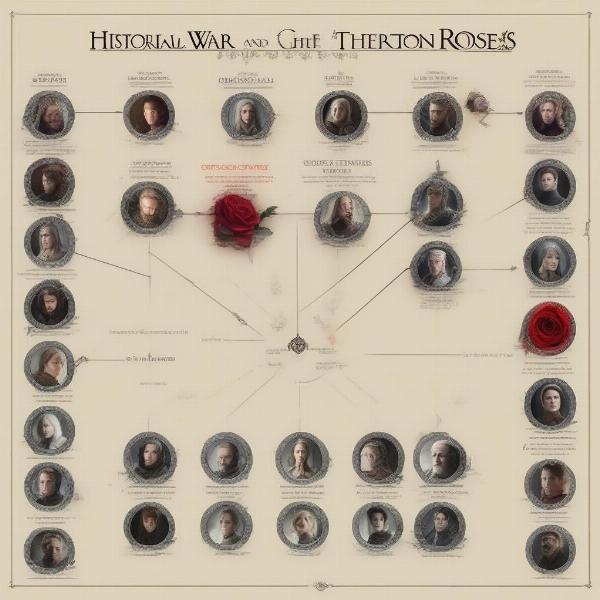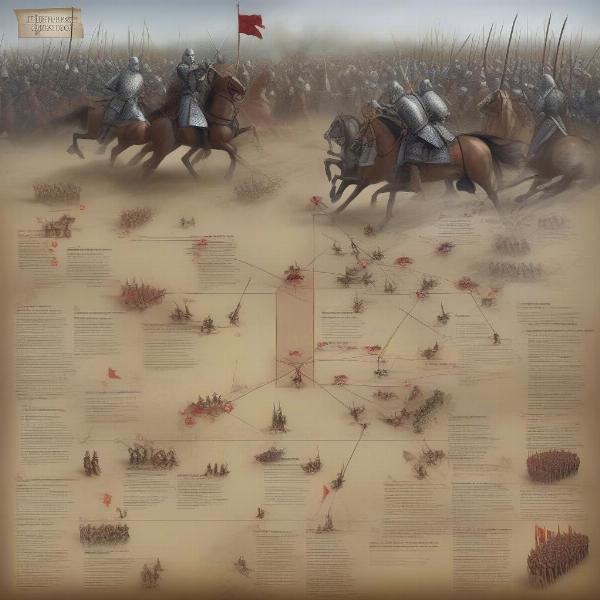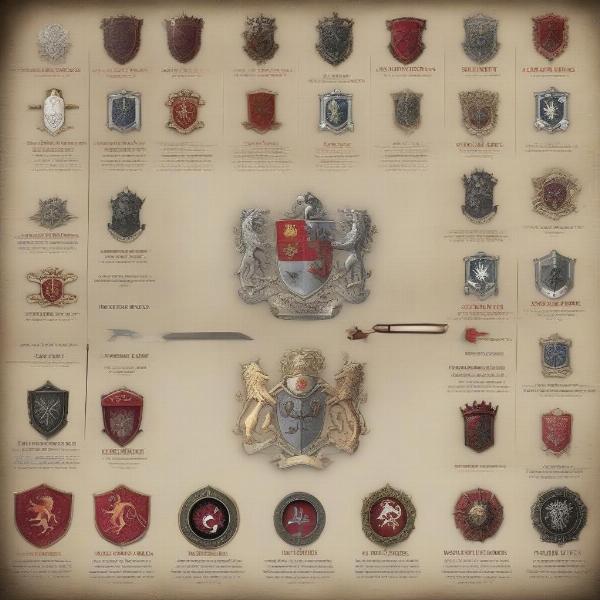The War of the Roses, a brutal English civil war spanning decades, profoundly influenced George R.R. Martin’s Game of Thrones. Understanding this historical conflict offers crucial insight into the complex power struggles, family rivalries, and political maneuvering that define the fictional world of Westeros. This exploration delves into the parallels between the historical War of the Roses and its impact on the Game of Thrones narrative.
The Key Players: Houses Lancaster and York vs. Houses Stark and Lannister
The War of the Roses pitted the House of Lancaster, symbolized by the red rose, against the House of York, represented by the white rose. This stark visual dichotomy mirrors the central conflict in Game of Thrones, where the Houses Stark and Lannister, often associated with metaphorical “white” and “red” connotations due to their contrasting moral alignments and symbolic imagery within the story, engage in a similarly devastating power struggle for dominance. While not a direct, one-to-one correspondence, the underlying themes of familial betrayal, shifting alliances, and the desperate fight for the Iron Throne (or the English crown) are undeniably resonant.
Tracing the Parallels: Betrayal, Ambition, and the Cost of Power
Both conflicts are characterized by relentless ambition and shocking acts of betrayal. Just as the War of the Roses saw shifting alliances and broken promises, the Game of Thrones saga is rife with treachery and deception. Characters betray their families, friends, and even themselves in the pursuit of power. The relentless cycle of violence, fueled by the desire for control, echoes across both narratives.
 War of the Roses and Game of Thrones Parallels: A Comparative Analysis
War of the Roses and Game of Thrones Parallels: A Comparative Analysis
The Role of Kingship: Legitimate Claim vs. Usurpation
The War of the Roses was fundamentally a dispute over the legitimate claim to the English throne. Similarly, the Game of Thrones revolves around the question of who has the right to sit on the Iron Throne. Both conflicts explore the complexities of succession, the legitimacy of claims, and the consequences of usurpation. The fragile nature of power and the lengths to which individuals will go to seize or maintain it are central themes in both historical and fictional accounts.
Analyzing the Tactics: Military Strategies and Political Maneuvering
The War of the Roses involved intricate military strategies and shrewd political maneuvering. The battles were often brutal and decisive, shaping the course of the conflict. This echoes in Game of Thrones, where military prowess and political acumen are equally important. Strategic alliances, betrayals, and carefully planned assassinations play crucial roles in determining the outcome of the power struggles in Westeros.
 Game of Thrones Military Strategies Inspired by the War of the Roses
Game of Thrones Military Strategies Inspired by the War of the Roses
The Impact of Family: Legacy, Loyalty, and Betrayal
Family plays a crucial role in both the War of the Roses and Game of Thrones. The conflicts are driven by family rivalries, loyalty, and betrayal. The competing claims to the throne are often based on familial lineage. In Game of Thrones, family bonds are repeatedly tested, with characters forced to choose between loyalty and ambition. This mirrors the complex family dynamics that shaped the War of the Roses, demonstrating how familial connections can be both a source of strength and a point of vulnerability.
What are the similarities between the War of the Roses and Game of Thrones?
The similarities are profound, extending beyond mere superficial resemblance. Both narratives explore themes of dynastic struggles, the corrupting influence of power, the importance of strategic alliances, and the devastating consequences of war. The characters’ motivations and actions in Game of Thrones often mirror the complexities of the historical figures involved in the War of the Roses, showcasing Martin’s meticulous research and keen observation of human nature.
 Game of Thrones Houses and Their War of the Roses Counterparts: A Visual Guide
Game of Thrones Houses and Their War of the Roses Counterparts: A Visual Guide
Beyond the Obvious: The Deeper Resonance
The enduring fascination with both the War of the Roses and Game of Thrones stems from their exploration of universal themes – ambition, betrayal, the struggle for power, and the consequences of war. Martin’s use of historical inspiration adds a layer of depth and complexity to his fictional world, enabling readers to connect with the characters and conflicts on a more profound level. The parallels are not always direct, but the underlying resonance is undeniable.
“The War of the Roses provides a rich tapestry of political intrigue, betrayal, and violence, mirroring the very essence of Game of Thrones,” comments Dr. Eleanor Vance, a renowned historian specializing in medieval England. “It’s not just a matter of borrowing characters or events, but a deeper engagement with the underlying themes and motivations that drive human conflict.”
The Legacy of the War of the Roses in Game of Thrones: A Lasting Impression
Martin’s masterful weaving of historical inspiration into his fantasy epic transcends simple homage. The parallels between the War of the Roses and Game of Thrones create a compelling narrative depth, offering readers a richer understanding of the fictional world and the complexities of human nature. By grounding his fantasy in historical reality, Martin crafts a story that resonates with audiences on both an imaginative and intellectual level. The impact is undeniable: a testament to the enduring power of history to shape our understanding of the present and our imagination of the future.
“The enduring appeal of both the War of the Roses and Game of Thrones lies in their exploration of timeless themes,” adds Professor Alistair Blackwood, an expert in fantasy literature. “The struggles for power, the complexities of family relationships, and the devastating consequences of war remain relevant centuries later.”
Frequently Asked Questions
-
What is the main connection between the War of the Roses and Game of Thrones? The main connection lies in the thematic parallels: family feuds, battles for the throne, political intrigue, and the moral ambiguities of power.
-
Did George R.R. Martin directly copy events from the War of the Roses? Not directly. Instead, he uses the War of the Roses as a source of inspiration, drawing parallels in themes and character archetypes rather than specific events.
-
How does the War of the Roses influence the characters in Game of Thrones? The characters’ motivations, their struggles for power, and their complex relationships often mirror the dynamics present during the War of the Roses.
-
Are there specific Game of Thrones houses that correspond to the Houses Lancaster and York? While not a perfect match, Houses Stark and Lannister share thematic parallels with Houses Lancaster and York, respectively.
-
What are the key lessons learned from the War of the Roses that are reflected in Game of Thrones? The key lessons revolve around the destructive nature of unchecked ambition, the fragility of power, and the devastating consequences of conflict.
-
How significant is the historical inspiration to the overall narrative of Game of Thrones? The historical inspiration is profoundly significant, providing the groundwork for the complex narrative, thematic depth, and the overall resonance of the story.
-
Where can I learn more about the War of the Roses? You can explore reputable historical resources such as academic journals, books on medieval England, and documentaries about the War of the Roses.
Let us know in the comments below what other historical inspirations you’ve discovered within Game of Thrones! Share your thoughts and insights.

